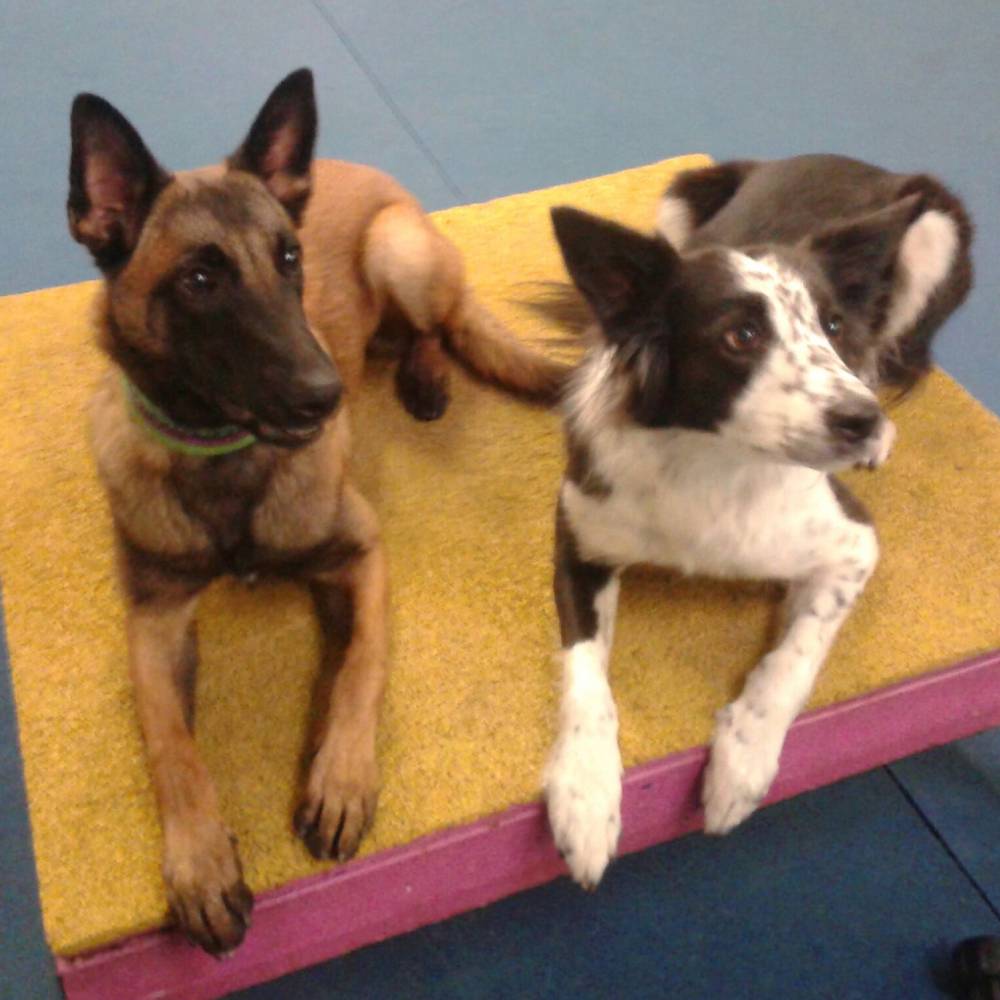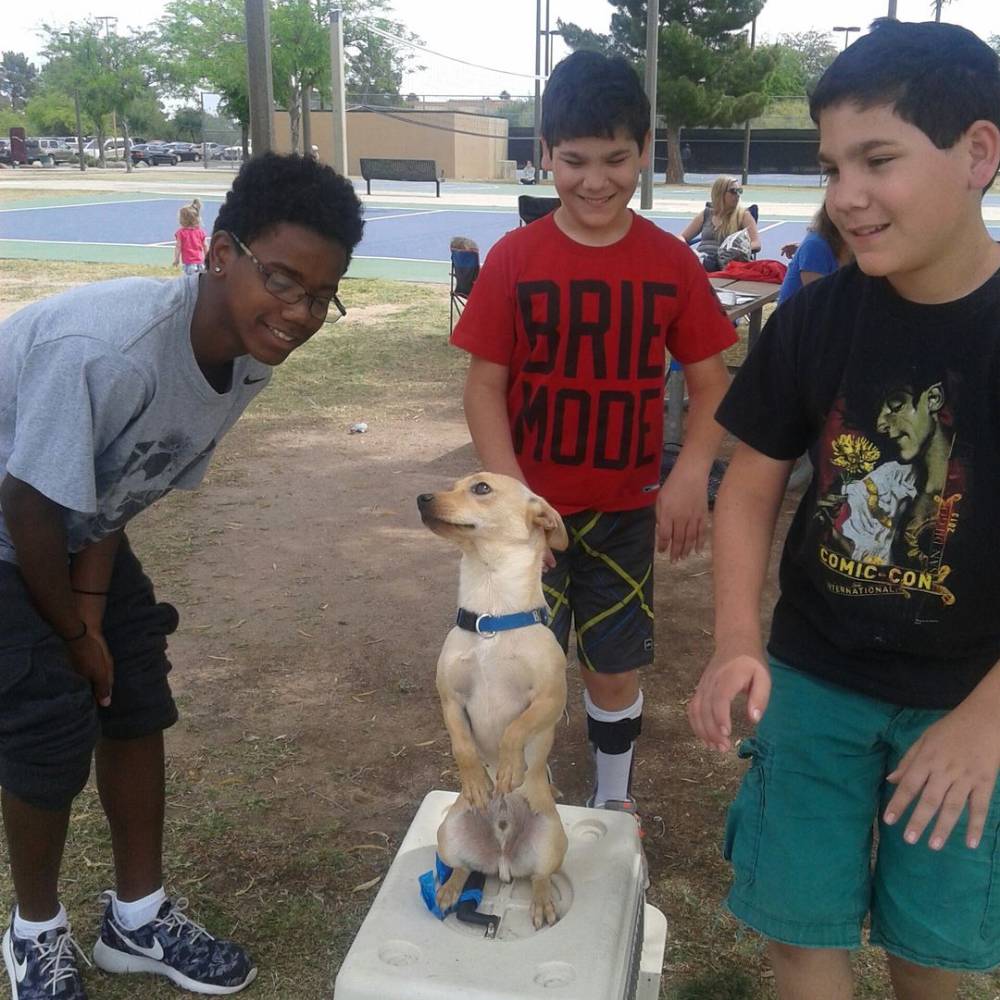Dogs may be a man’s best friend, but as it turns out, they make pretty good therapists, too.
That’s the founding premise behind Raising Hope Dogs, a non-profit founded by a dog trainer and an occupational therapist training dogs to be therapy animals for autistic children.
But Raising Hope Dogs, founded in 2015, is doing more than using dogs to help autistic children practice life skills. It’s also giving rescued dogs the chance to become skilled working dogs with an important job to do.

Raising Hope Dogs co-founders Karen Rice and Wendi Faircloth stumbled across this winning formula almost by accident in 2013, when Rice (the occupational therapist) hired Faircloth (the professional dog trainer) to train her new puppy.
But the therapist also saw how her young patients–-who struggle with mobility, speaking, emotional regulation, and other autism-related issues–-responded to her new dog at work. Whenever Wendi and the dogs were around, Karen’s young patients tried harder to accomplish the task at hand.

“The kids became willing to just try really hard to accomplish a task that normally they would allow the environment or the demand of the activity to shut them down,” said Karen, who came to realize that therapy dogs could help autistic children–who are easily overwhelmed by outside stimuli–confront their fears and be brave.

Now Karen has seen this winning formula play out many times throughout her career. One 4-year-old patient was selectively mute because he was frequently misunderstood and hated repeating himself to anyone else in his busy foster home. But the child didn’t mind repeating himself to Frisco, the border collie/service animal who became one of Raising Hope’s “founding dogs.”
“This kid would repeat the same request four or five times and get louder and louder each time because when the dog did understand it and did what the kid asked, it just lit his face up,” said Karen, recalling how working with Frisco helped build the child’s linguistic confidence.

Another example involved an 8-year-old boy who grew so overwhelmed at school that he had to wear latex gloves. “He just could not even handle touching the world,” Karen said. But although the child usually wore gloves anytime he was outside his house, he forgot his fears upon meeting Frisco, who further impressed him with her talent for fetching toys.

But while Joshua wanted to play, throwing the toy would mean touching dog slobber, which he was afraid to do. But having Frisco and Wendi (who helped by wiping the toy on her pants) nearby gave him the confidence to take a chance. “The first time or two he would touch [the toy] but then he’d have to run to the bathroom to wash his hands,” Karen said.
But by the end of the session, Joshua wasn’t wiping his hands on Wendi’s pants anymore. Shortly after meeting Frisco, the child even stopped wearing his gloves. “It wasn’t just the impact of that moment,” the therapist recalled. “It changed his daily life outside of that session.”
Now Raising Hope Dogs has grown into a registered non-profit with 9 working dogs from a variety of backgrounds. Some dogs are rescued. Others are “pre-rescued,” as Karen calls them, describing dogs donated by community members who might otherwise take them to the shelter. Other dogs have been donated by breeders.
READ RELATED: Shelter Cat and Guinea Pig Best Friend Get Adopted Into Perfect Home Together

But regardless of their backstory, Raising Hope dogs have one thing in common. They’ve all undergone 18-24 months of rigorous training to develop the skills to work with autistic children, either as an autism support dog or as a therapy animal placed in a therapist’s office.
The dogs also participate in Hope Dog Challenge, a community sports program that gives autistic kids the opportunity to practice their physical, mental, emotional, and social skills over team-building games of frisbee.

In the early days of the pandemic, Karen and her therapy dog, Dandy, were also conducting Zoom sessions from home, which the therapist began calling “Dandyland” to the great delight of her young patients.
Now the pair have resumed seeing patients in person, and it’s clear the therapy dog hasn’t lost her magic touch. During one recent session, Dandy even inspired a teenager to try walking without his wheelchair.

“He won’t even get out of his wheelchair when we’re together without the dog,” said Karen, whose 14-year-old patient suffers from conversion disorder, a rare condition that’s left him believing he can’t eat, talk, or walk without assistance. But when Karen brought Dandy to her patient’s complex, the teenager surprised his therapist by getting out of his wheelchair to play with the dog on the floor.
“He stands up, he’ll walk around the block with Dandy at the side of him,” said Karen, who has been shocked by her patient’s sudden mobility. “It’s all about him hanging out with Dandy and not about this imagined need to be wheelchair dependent.”

Raising Hope Dogs also used the pandemic to move into a larger property in Flower Pot, Arizona, a small town north of Phoenix. The move has provided more space for Raising Hope’s expanding number of dogs and puppies-in-training–some of whom also have difficult backstories, much like the low-income children they work with.
“They’re so human-like in their limitations,” said Karen, explaining how the dogs have also overcome their personal challenges through bravery and hard work.

This includes Secret, a temperamental puppy who grew up to be one of Raising Hope’s finest therapy dogs, and Dandy, the clumsy puppy who now inspires wheelchair-bound patients to walk. Frisco dealt with rapidly advancing cancer in his old age, while Rebel, another Raising Hope dog, overcame an aversion to transition surfaces.
“It’s just a very special, unique thing,” says Karen of the symbiotic relationship that’s formed between the dogs and children. “It’s not just kids and dogs,” she said. “It’s the highly skilled working dogs, and it’s the kids with these really extreme challenges. It’s just a special thing that’s evolved here over time.”
Find out more about Raising Hope Dogs by following them on Facebook or TikTok.
Source: The Autism Site Blog





